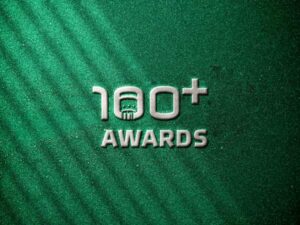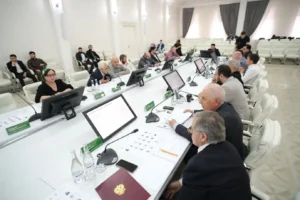On 30 March 2023, as part of Mosbuild 2023, Russia’s largest exhibition and business event in the field of construction, the Green Building 2023 conference was held in partnership with ITE Group and the RuGBC Green Building Council, with the support of the EcoStandard group. Experts who shape the meaning of green building in Russia and are annually invited by RuGBC share their year’s results and vision for the future.
The conference program included three main blocks and a practical master class: the first, plenary session, was devoted to legislative initiatives, green standards and urban development issues; the second was the presentation of a new version of the environmentally friendly materials catalogue GREEN BOOK, supported by EcoStandard group and RuGBC; the third, green technology session – case studies of manufacturers of innovative environmentally friendly materials. The practical part included a master class devoted to the demonstration of the construction of a usable green roof and the installation of solar collectors on the roof.
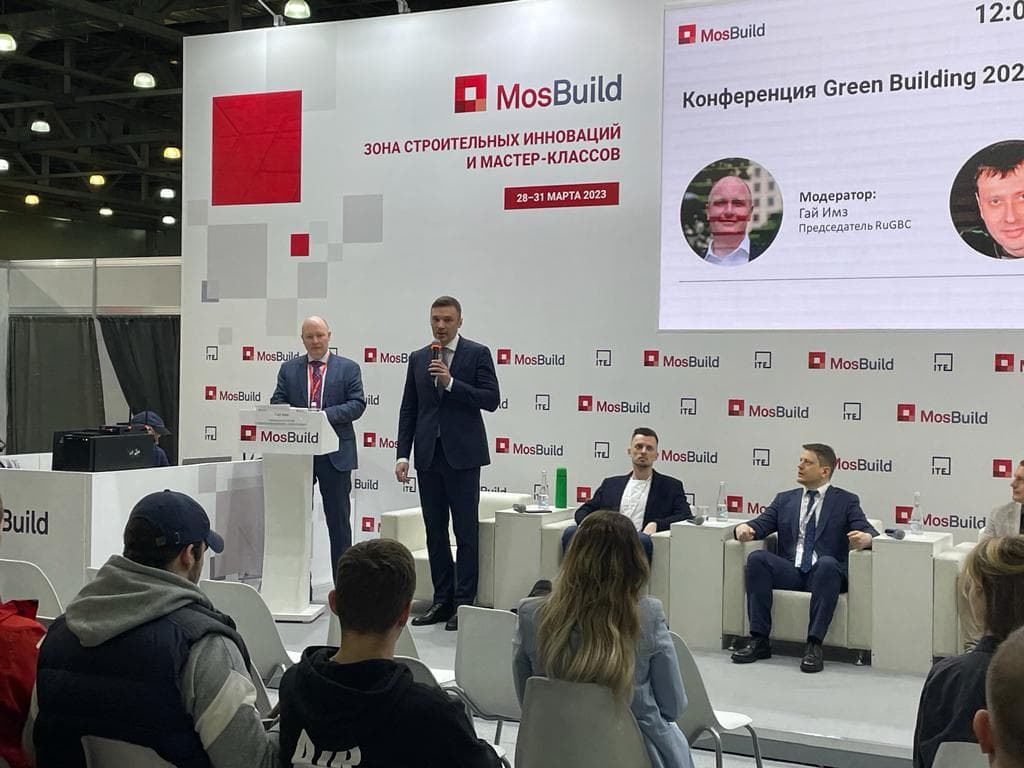
Yakov Syromyatnikov, Director of Mosbuild, opened the conference with a welcoming speech. In his speech, Yakov highlighted the long fruitful cooperation with the Green Building Council, which has helped to increase the rate of growth of green building technology and the steady increase in people’s knowledge of green building and its significance.

The moderator of the plenary session “Green Building in 2023” Guy Eames, Chairman of RuGBC, welcomed the speakers to the Conference, noting the major leap forward over the year in green technology and the way forward for the industry given the dramatic changes in the emerging areas of ESG, green finance and RF green standards.

The first speaker was Prof. Nikolay Shilkin, Executive Secretary of TC 474 “Environmental requirements to real estate objects”, editor-in-chief of “Energy saving” magazine. The report of Nikolay Vasilyevich was titled “Activity of Technical Committee 474 of Rosstandart” chaired by Yury Tabunshchikov, President of AVOK NP. The TC unites a number of specialised organisations to jointly seek solutions and develop recommendations on establishing criteria that promote environmental safety, energy saving and construction decarbonisation. Nikolay also talked about ecological requirements for real estate objects, including sustainable development requirements, guiding documents, implementation of the principle of sustainable development and basic categories defining ecological requirements for real estate objects. Nikolay Shilkin focused on the standardization plan of TC 474 for 2023/2024, including the standard “Environmental Declaration of Building Materials and Technologies. General requirements” which will allow manufacturers of building materials and technologies to declare the green difference of their products from similar ones.

The report of Mr Andrey Kuznetsov, Head of the Sustainable Development Department of JSC “Bank DOM RF”, was devoted to the topic “National system of green certification of residential buildings”. Andrey made a comparative analysis of the National standard for green MFBs with foreign green standards, noting that the best international practices were taken into account when developing the “green” GOST R criteria. “Green” GOST R for MFBs was approved on 9 September 2022, it is planned to approve “green” GOST R for individual housing construction already in 2023 and “green” GOST R for capital repairs in 2024. Also, the process of GOST R assessment through the UISZhS, the single source of information on GOST R compliance, was described. In addition, Andrey spoke about training programmes for immersion into the methodology and process of assessment according to the green standard for MFBs.

“Russian IRIIS and Klever certification systems” was the topic of the presentation by Artem Volodkin, Managing Director of the National PPP Centre. “Klever is the Russian analogue of international systems such as WELL, BREEAM and LEED, in the development of which the peculiarities of the Russian real estate market were taken into account. IRIIS, in turn, conducts an independent examination of the object and assigns points, on the basis of which the certification level is determined and an appropriate conclusion is issued. The key features of the certification systems presented are transparency of the scoring system developed jointly with the expert community, market leaders and development banks, flexible system that adapts to the market conditions, as well as third-party verification system. In addition, Artem noted that IRIIS and Clover are recognised at the legislative level and are included in the taxonomy of green and adaptation projects in the Russian Federation, approved by Russian Government Resolution No. 1587 of 21 September 2021.

Alexander Dolganov, Deputy Chairman of Center-Invest Bank’s Management Board, shared the bank’s experience in green finance, spoke about the integrated approach of responsible ESG banking, and drew a parallel with his speech at our Green Building 2022 last March. “At the product level, we have launched green mortgages for households and for businesses. So far there are almost no MFBs built to green standards or certified on the market, we are looking at available metrics, such as the energy efficiency class of the building. However, the main point I mentioned at the last Mosbuild, we have implemented. There is a discount to the base mortgage rate for purchasing a property with a high energy efficiency class. This year we plan to take a deeper look at the carbon footprint of our mortgage portfolio. Given that mortgages occupy a significant portion of our assets, we are interested in valuing our funded issue.” – Alexander noted.

Daria Tolovenkova, Deputy Chief Architect of the City of Kazan and Head of Department “Development of Urban Ecological Framework of Kazan” at the Institute of Urban Development, spoke on “Water Green Urban Ecological Framework” which is a system of interconnected green spaces including urban green areas, agricultural and natural areas and high humidity zones. The water and green ecological framework is integrated into the planning structure of the city, being the basis of its planning and landscaping. Daria gave unique examples of pilot implementation of the urban ecological framework in Kazan, told about the plans to expand the practice at the national level, as well as about the joint working group with RuGBC to initiate practices and develop standards for the urban ecological framework, including GOST R.

Pavel Blokhin, CEO of ReinnolC, talked about the ‘Closed Loop Economy in the City and at the Plant’, which has a complex effect on the economy, environmental safety and ESG index of the plant, including significant reduction of water consumption from natural sources, multiple reduction of discharges and obtaining recycled product for own process needs. Pavel highlighted the industrial project with EVRAZ on wastewater recycling, showing a very informative video of the pilot project.


As part of the second block of the Conference, Ksenia Lukyashchenko, EcoStandard group Managing Partner and NP NBESR leading expert, and Victoria Gluschenko, EcoStandard group Project Manager, presented the new seventh version of the GREEN BOOK green materials catalogue, which is a tool for choosing safe construction materials, facilitates selection of materials for green properties and contains information on the characteristics contained in the green standards criteria. Ksenia described the objectives of the Green Book project, as well as the structure of the catalogue, areas of application, updates made, including the structure and criteria for inclusion, ecosystem approach and new organisers. Representatives of the participants in the catalogue also spoke and explained why they had chosen to include their products in the catalogue and what the benefits were for them.
The third block of the conference was the Green Technology Case Session, moderated by Dmitry Berezutsky, board member of the RuGBC Green Building Council.

Speaker Yury Khakhanov, Director of Acceleration in the Urban Technology area of Skolkovo Energy Efficient Technologies Cluster of the Foundation, devoted the report to “Skolkovo Green Technology Initiatives” reflecting the portfolio of innovative projects, a unique conference STARTUP VILLAGE and acceleration programme Build UP, aimed at development of urban technology. Separately, Yuri mentioned the value of long-term cooperation with RuGBC ‘Green Building Council’ experts in the field of scientific and technical exchange, innovation expertise, green solutions assessment, and joint activities.
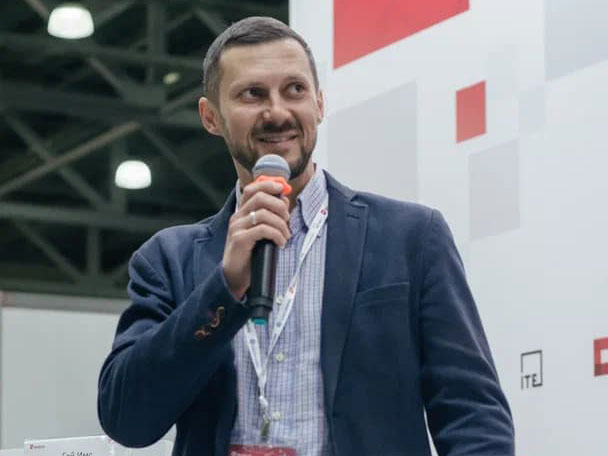
President of the Guild of Landscape Engineers, founder of Sayan Group, Alexey Sayanov, in his report ‘Green Roofs and Spaces’ reflected on the theme of operable roofs, including extensive and nature-like landscaping, which are monofunctional and fulfil important aesthetic, social and environmental functions.

“City Farms” was the keynote presentation by Anna Vitina, director of the Russian company Greenbar, during which Anna spoke about the development of urban crop farms that allow food to be grown indoors, replacing natural conditions with artificial ones. Instead of a field – tiered vertical beds, instead of the sun – modern LEDs, the ground has been replaced by water and organic nutrient cocktails for plants, instead of wind ventilation, and instead of an agronomist, AI acts.

Alexei Mikheev, head of Sloplast’s Art House division, spoke on ‘Modular Houses’, describing the technology for constructing quickly constructed non-capital buildings, PreFab construction houses, which allow a house to be ready for use in 30 days or less.

Alexander Pikalov, General Director of Smart SREDA Moscow, gave a presentation on “Recycled Plastic Furniture”. Alexander spoke about a network of eco-factories specialising in recycling recycled materials from mixed plastics and producing environmentally friendly building materials and small architectural forms for landscaping around the courtyard, city and park areas.
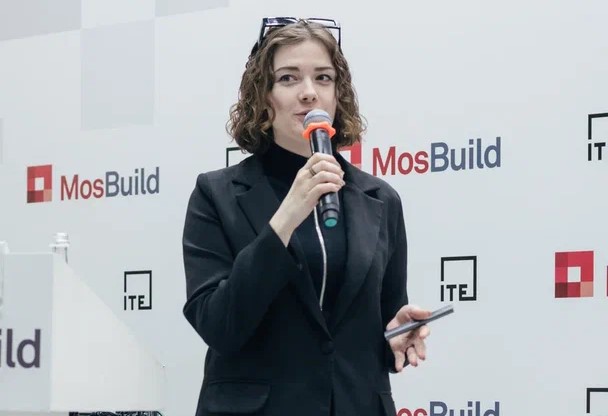
The founder of SPAWN, Daria Tokareva, described a unique technology for ‘growing’ construction materials and furniture from waste, such as receipts, disposable dishes, cigarette butts and other cellulose-containing residues using mushrooms.

Alexey Skorobatyuk, founder of New Pole, gave a presentation on “Solar Energy”, describing modern technologies for making and operating solar collectors – devices for collecting heat energy from the Sun, transported by visible light and near-infrared radiation, producing heat carrier material.

At the end of the green technology session, Kirill Zubkov, founder and head of SOW&H Service, delivered a report entitled “Environmental parameter monitoring system”. He showed the tools developed for interaction of real sensors measuring environmental parameters, including electromagnetic radiation, light intensity, temperature, concentration of CO2, etc., which enables accurate collection and analysis of environmental data.

Moderator Dmitry Berezutsky, RuGBC summarised the technology session in conclusion – that green technologies in practice break many myths, build new cyclic production chains, precise life cycle scenarios, allow managing cost and impact on the environment and people, replace obsolete technologies and solutions, improve quality and longevity of human life. The introduction of green innovations in construction takes place through encouraging applications with green building certification – allowing successful innovative practices to be highlighted, verified and standardised. The Russian building science and research complex should systematically promote the piloting, analysis and comparison of innovative green technologies.
At the end of the conference, Guy Eames, Chairman of the RuGBC Green Building Council, gave a closing speech: “Everyone is familiar with the expression “until the thunder strikes, no man shall make the cross! In the last year there have been many reasons for optimism in the world of green building in Russia. For a start, Russian national standards and assessment methodologies for residential and industrial buildings were finally introduced, supported by the government development agencies DOM.RF and VEB.RF, linked to real economic support through a taxonomy programme and enabling the overcoming of the main barriers of BREEAM and LEED – language and financial motivation. Russia is expanding cooperation with its closest neighbours in Central Asia and the BRICS countries. I predict that by this time next year we will have a broadly unified CIS green building market with 1,000 projects.”


In the practical part of the Conference, Alexey Sayanov, founder and head of Sayan Group, and Alexey Skorobatyuk, founder and head of New Pole, conducted an hour and a half master class dedicated to visual construction of a maintained green roof as well as integration of YaSolar solar collectors for solar hot water supply into the green roof. The master class demonstrated technical solutions, roof pies, pathways, installation methods, landscaping and the correct installation of the solar thermal systems. The master class presenters answered numerous questions from the audience.


